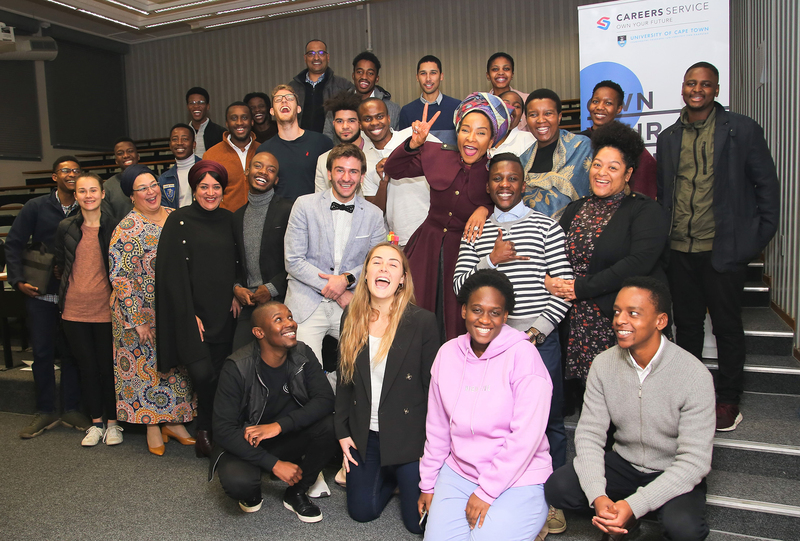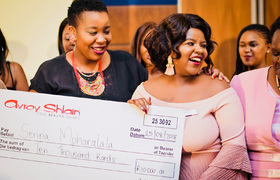UCT entrepreneurs in regional competition
25 June 2019 | Story Niémah Davids Photos Je’nine May. Read time 5 min.
Nearly a dozen University of Cape Town (UCT) students with big ideas for their own businesses will proceed to the second, regional leg of the Entrepreneurship Intervarsity competition after wowing the judges with their futuristic business concepts.
The second stage of the competition, which follows the initial internal round, will see UCT’s top 11 student entrepreneurs going head to head with students from other universities in August. The winners from that leg will move on to the national finals in September.
The Entrepreneurship Intervarsity competition aims to identify the top student entrepreneurs at each of South Africa’s public universities, to recognise and showcase their businesses, and to attract investment into their enterprises. It also provides a chance for aspiring entrepreneurs whose businesses are still in the ideas stage to pitch their concepts.
The event is a first for the Entrepreneurship Development in Higher Education (EDHE) programme and runs in collaboration with the Allan Gray Orbis Foundation and the SAB Foundation. It is presented by the Department of Higher Education and Training (DHET) and Universities South Africa (USAf).
“With this competition we wish to grow the next generation of business leaders in South Africa and hopefully the world.”
Next generation business leaders
Nadia Waggie, UCT’s Entrepreneurship Intervarsity competition liaison officer, described the internal leg of the event as an “overwhelming success”. She said the students had five minutes each to pitch their business ideas to the judges.
“With this competition we wish the grow the next generation of business leaders in South Africa and hopefully the world,” she said.
The entries were grouped into four categories: innovative business ideas, existing businesses – tech, existing businesses – social impact, and existing businesses – general.
She told the competitors that the UCT community is “extremely proud” of them, regardless of the outcome.
“The fact that such a large group of you chose to enter the competition and present your ideas is encouraging. It demonstrates your commitment to developing and growing SMMEs [small, medium and micro enterprises] in South Africa, contributing to employment figures and ultimately becoming the next generation of business leaders in our country.”
Innovative ideas
The list of innovative business concepts presented was wide-ranging.
Property studies student Boutros Mbina’s “Affordable Housing” idea made a big impression and earned him a spot in the top three in the innovative business ideas category. His aim is to address the shortage of affordable housing and decrease the number of informal dwellings in South Africa, by converting shipping containers into houses.
“I have identified that shipping containers could be a welcome solution to this problem [of affordable housing]. Containers are easy to set up and transform into a habitable space and are cost efficient,” Mbina said.
Waggie said other ideas included Tamir Shklaz’s digital one-stop shop, Quillo, which allows students to buy and sell old textbooks online at an affordable price. Shklaz entered the existing businesses – tech category.
Mvelo Hlophe’s business, Zaio – a gamified platform that offers open access learning journeys to students who wish to become upper-end software developers – will also proceed to the regional round of the competition. Waggie said Zaio falls in the existing businesses – social impact category.
Environmentally-friendly ideas were among the pitches too, and Jennifer Dove topped that list. Her business, Suck it Straws, which features dishwasher-safe glass straws with an African twist, was one of the top three in the existing businesses – general category.
“Plastic straws are used for a couple minutes and never again, so by having your own Suck It Straw with you, you can help save the planet and the marine life too,” Dove said.
UCTʼs regional round contestants:
- Boutros Mbina – Affordable Housing Community
- Lungile Macuacua – LabV
- Tshiamo Monyai – The Creativeʼs Plug
- Denislav Marinov – DVM Designs
- Olwethu Tomtala – Walla
- Tamir Shklaz – Quillo
- Busisiwe Mkhumbuzi (Pooe) – Tshimong Social Investments
- Max-Gordon Stoffberg – Question Mark Kaffy
- Mvelo Hlophe – Zaio
- Jennifer Dove – Suck It Straws
- Manqoba Mdamba – Changing Lives Shoe Laundry
 This work is licensed under a Creative Commons Attribution-NoDerivatives 4.0 International License.
This work is licensed under a Creative Commons Attribution-NoDerivatives 4.0 International License.
Please view the republishing articles page for more information.










